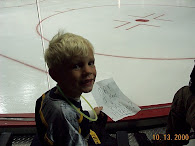NHL Commissioner Gary Bettman has his annuel pre- Stanley Cup address and press conference to the media gathered in Vancouver. A wide variety of topics were covered. Here is the transcript from NHL Media Services...
Video from NHL.com added...
2011 Stanley Cup Final: Commissioner Bettman News Conference Transcript
COMMISSIONER BETTMAN: Welcome to Vancouver and the 2011 Stanley Cup final. Congratulations to the Vancouver Canucks and the Boston Bruins on terrific seasons and in particular congratulations to Francesco Aquilini and Jeremy Jacobs and the managements, staffs and players on both teams after the incredible regular?season and playoffs so far. This should be an exciting and fun Stanley Cup final.
We are concluding with this series what on every level has been a terrific season. The level of competition, the competitive balance has been unequaled in any season, and probably in any sport. Our fans have connected to our game in every way possible on every metric setting record numbers on every platform it's extremely gratifying. We know the importance of how we connect with our fans. You have the numbers. If you need them again, our folks in PR will be happy to give them to you.
When we came back from the work stoppage, we were projecting revenues for the return?to?play season of around $2 billion. We said if we could get to $3 billion by the last year of the basic term, which is the 2010/11 season, the growth rate would have been great. It's too early to tell with exact precision, but if we're not exactly at $3 billion, we're certainly within chipping distance of it.
We continue to develop a relationship with the Players' Association with Donald Fehr, who is here today. The good news, from my standpoint, is that it's too early to focus on Collective Bargaining, particularly since the other sports leagues have to go first. When Don and the union are ready to go, our process will begin.
The strength of our game on the business side could be best illustrated by our reaching the largest sponsorship deal in our history the Miller?Coors?Molson deal and the largest, most comprehensive deal in our history with NBC Universal Comcast.
However, with all of these positive developments, we never lose sight of the issues. From a franchise standpoint, while we've never been stronger in both Canada and the United States, we did have to do something that we hadn't done in 14 years, and that is deal with a relocation. We mourn the loss of Atlanta, but we celebrate our return to Winnipeg, and we are excited about our future there.
I know this was extensively covered yesterday, so I will spare everyone a recap. But it is worth noting that the deal was only made yesterday, and that's why it was announced when it was. I'm glad, however, we were able to do it before the start of the Final. Frankly, it stops all the speculation that we had been seeing for weeks. And, quite frankly, if it hadn't gotten done yesterday, there's a good chance it might not have gotten done at all.
With regard to the game, there were occasions this season when the focus on the competition turned into a debate about concussions, about hits involving players' heads and whether supplemental discipline was serving its intended purpose as a deterrent to actions that we'd prefer not to see on the ice.
We all agreed at the General Managers’ meeting in March that we needed to take a look at the way we define and discipline charging and boarding infractions. As you recall, I empaneled a committee of Brendan Shanahan, Steve Yzerman, Rob Blake, and Joe Nieuwendyk to undertake that examination, and to also consider how we might broaden Rule 48, which prohibits blindside and lateral hits where the head is targeted or is the principal place of contact.
The committee's work in that regard continues and the members hope to be in a position to report to the general managers at their meeting next week, then to the Competition Committee, then to the Board on June 21st.
In addition to even better address player safety, an area in which we have consistently had a leadership role, particularly as it relates to concussions, I am creating effective after this season a new Department of Player Safety which will be headed by Senior Vice President of Player Safety and Hockey Operations, Brendan Shanahan.
In this revised role, Brendan will be responsible for developing rules related to better protecting our players without changing the fundamental nature of our game, dealing with equipment and safety issues related to equipment, and pursuant to a request made by Colin Campbell, Brendan will administer commissioner supplemental discipline.
The thinking on this discipline change is as follows:
First, I know this is one aspect of Colie's job that he hates. It could be the most thankless and worst job in hockey, particularly after enduring it for more than a decade.
Two, both Colin and I believe that it is time to take a fresh look at the standards that we use, and if we're going to move to harsher discipline, that change needs to send a clear message, and we think it would probably be best to do it on a clean slate. Having Brendan, who only recently came off the ice after a wonderful career, will give us the adjustment and the focus and the credibility that this change will bring about.
Three, we are planning a technology upgrade in video replay. We are looking at arena conditions and at other rules to keep the game open, fast and skillful. We need to spend even more time focused on officiating, and in light of E.J. McGuire passing, there is a need to focus more attention on Central Scouting.
Clearly, those elements are more than an all?encompassing job. Colie and I decided if he sheds commissioner supplemental discipline, he can spend more time on these other vitally important issues.
It would be unfair, inappropriate and simply wrong to suggest that this reorganization in any way is a diminution of Colin or his role. The game is being played at the high level that it is because of the rule changes Colie put together and implemented. While many people contributed to the new game, it is Colin who put it together and made it work. I don't think anybody should lose sight of that.
By the same token, having someone of Brendan's caliber focusing his and his department's full?time energy, efforts and attention on player safety demonstrates our ongoing commitment to the safety of our players and our game.
Again, welcome to the Final. Thank you for joining us. I am happy to take questions.
Q. Gary, you guys developed something called a concussion protocol at the recent GM meeting. Yet in the playoffs we've seen where it waivers in terms of is the player concussed, does he go to the quiet room, does he come back. Is there a way for you guys to have an actual protocol with independent people making these calls?
COMMISSIONER BETTMAN: Well, I'm not sure of your characterization of what goes on. I think the people who are making these decisions are professionals from a medical standpoint, the physicians, the trainers and the like.
It is a work in process. We're trying to implement it in a way that makes common sense. I know lots of people are suggesting we should just be meting out fines. We're thinking and believing that the best way to do this is work the process through with education and getting everybody to buy in to do the right things.
For the most part we've been happy with the protocol's effectiveness and how it has been used. But it is something that we're working into the system. We think it will improve over time.
Q. Gary, in terms of reassigning Colie's responsibilities, was there a single tipping point in this decision or is this something that gradually evolved because of the complexities of what you talked about?
COMMISSIONER BETTMAN: I think the single tipping point was Colie coming to me and saying he thought this would be a good idea in light of all the things we discussed. We talked about it. I thought about it. I thought about, in part, how long he's been doing that element, what a thankless job it is. I say that now with Brendan in the room because I was kind of painting a slightly different picture for him as I was trying to persuade him to do this.
But there was no tipping point. The tipping point may have been 13 years, I think it is, of supplemental discipline. At some point you deserve to have your sentence commuted.
Q. When did you do this?
COMMISSIONER BETTMAN: This is something we've been discussing probably for at least a couple of months.
Let me add one other thing. I was hoping to discuss this with the Board on June 21st before we announced it. But somehow this era of digital technology put it in play. I thought it would be better to address it to end the speculation. We just came off a couple of months of speculation on another topic. I figured this one I needed to deal with directly.
My preference was not to have announced it today, but you deal with what you are dealt.
Q. Can you update where things stand for realignment in lieu of Winnipeg's reentry, and also the latest on Phoenix?
COMMISSIONER BETTMAN: With respect to Winnipeg's re-entry, obviously there is a process under the Constitution and Bylaws with respect to ownership transfers and relocation that needs to be complied with. That's on the agenda, will be on the agenda, for the June 21st Board meeting.
In order to do a schedule for next season, it's not possible to do realignment right now. Winnipeg, despite its geographic peculiarities relative to the Southeast Division of the Eastern Conference, will be playing in that division and in that conference, with an assurance that for the following season they will be in the west.
We have a number of clubs that would like to address specific issues on realignment. All those clubs need an opportunity to be heard. That's a process we'll go through the first half of next season, looking at the issues that clubs want to raise, looking at various possibilities, and trying to figure out what will make the most sense moving forward.
If I had to guess anything, and this is purely speculation, as much as I hate to do that, because ultimately it's a Board decision, I think we'll wind up moving towards a slightly more balanced schedule to accommodate the variety of issues I've heard so far from the clubs.
Q. Phoenix?
COMMISSIONER BETTMAN: Phoenix, as I think you all know, because it's gotten a ton of attention, the City of Glendale stepped up and said they want the team to stay another year while they try to complete the sales process with us and will be funding the losses. Any suggestion that the League is funding this club or carrying the burden is not true. Last season the City of Glendale did it. This coming season the City of Glendale will do it, but hopefully not. Hopefully the club will be sold in due course, and there will be a new owner in there to start turning things around.
Again, we've gotten a number of questions about why this process in Phoenix and why the other process in Atlanta. Atlanta, not unlike Winnipeg in '96, found itself in a situation where nobody wanted to own a club in that market anymore. That's been for me the trigger point on having to deal with a relocation.
With respect to Phoenix, you have a city in Glendale that built the building and has invested in it and wanting the club to stay there. As long as they're prepared to carry the burden of doing this while we try to effectuate a solution, there's no reason to move.
Q. Gary, Brendan's new duties take effect next season, is that correct?
COMMISSIONER BETTMAN: The act of administering supplemental discipline will not be for this round of the playoffs, it will be for next season. He has a lot of work to do getting ready for next season, and his ongoing work with the Blue Ribbon Committee and dealing with issues from a safety standpoint to get us ready for next season start immediately.
Q. You alluded to harsher penalties. Is that your expectation, that we will see more severe supplemental discipline than maybe we've seen in the past?
COMMISSIONER BETTMAN: That is my hope and expectation. That is something that we want to discuss more fully with the Players' Association.
But from my standpoint, Colie's standpoint and Brendan's standpoint, if there's certain conduct that we want to see out of the game, then we've got to make sure we do what's necessary.
I try to view this, it's one of the reasons I'm taking this step in creating a department. Discipline, people like to focus on punishment. I'd rather focus on using the supplemental discipline mechanism to better promote player safety.
Q. Steroids have obviously run their course through all of the professional sports. Yet your sport, your league, has not had a positive test in years, as I can recall. People who know steroids say if you're not catching anybody, your testing isn't good enough. Is it your belief simply no NHL players are doing steroids now?
COMMISSIONER BETTMAN: Well, it's clear that if we're not having positive tests, none of them are getting caught, which means if some are, it's not very many.
I do believe, and we've been in discussions over the last couple of years with WADA, there are ways that we can improve our substance testing, our performance?enhancing testing program. But that's something we need to do with the Players' Association, and that's something, when we actually sit down and begin discussions, we need to address.
I think we have a good program. It deals with education and counseling. It has comprehensive testing, but I think we can probably do more. At the right time we'll have that discussion with the Players' Association.
Q. There's been recent reports of a group in Seattle interested in an NHL team. What are your thoughts on Seattle as a hockey market? With Winnipeg done, do you have a list of cities that are potentials?
COMMISSIONER BETTMAN: There are no shortage of places that continue to express interest in having a team. I think it was half a dozen, and now it's down to five because Winnipeg comes off the list. My answer is the same. I don't want to raise anybody's expectation. We're hoping not to do relocation. You all know that we don't believe in doing that, except as a last resort. We do everything possible to avoid it, and we're not planning on expanding.
The interest is flattering, but I don't want anyone in any market that doesn't have a team to get their hopes up yet.
Q. Québec City was involved, Pierre Peladeau, the owner of Quebecor, launched a sports channel yesterday. He got 25 games of the Ottawa Senators. Is there some sort of relation there that we can say they are up front to get something in Québec City done or there's absolutely nothing to deal with that?
COMMISSIONER BETTMAN: I am not going to raise expectations. I'm well aware of Mr. Peladeau's interest and that is gratifying. I am well aware there are plans to build an arena, although we have made no promise of what will happen after that.
At the present time, since I don't have a franchise we're looking to relocate, and as I said, we're not planning on expanding, I don't want to get people's expectations in Québec City raised.
Q. Despite the $3 billion in revenue across the League, a lot of teams are losing money, or at least claim to. Is the gap too large between high and low revenue teams? Especially now that you're in Winnipeg, what adjustments need to be made to revenue sharing and the CBA, the next one, so those clubs can be in the best position to succeed?
COMMISSIONER BETTMAN: The fact we're in Winnipeg, the agreement is basically self?executing. It will apply to the Winnipeg team as it applied to the Atlanta team, again, assuming Board approval, which everybody is anticipating.
To the extent there are issues in Collective Bargaining, as I said in my opening remarks, the good news is it's too early to discuss it. The discussions I'll have in the first instance on that topic will be with Mr. Fehr. I won't be doing it in this environment.
Q. Is the gap too big?
COMMISSIONER BETTMAN: We have a system that is dramatically improved from where we were in terms of teams' ability to compete. You've seen it in our competitive balance. There has been dramatic improvement. Whether or not the Players' Association or we are going to be looking for adjustments is something we'll look at quietly and hopefully resolve quietly.
Q. Your office put out numbers on concussions specific to how they were suffered, be it from fighting, be it from hitting, whatever. The number that caught my eye was from fighting. I think it was 8% or somewhere around there. I'm wondering, after you've given out those numbers, has there been added talk, be it from managers, owners, governors, specific to that part and their interest in perhaps ending fighting?
COMMISSIONER BETTMAN: I don't think the discussion has gotten to the level where there's widespread sentiment to end fighting. I'm not sure exactly what you mean by 'ending fighting.' I assume you mean by increasing the penalties for fighting, because there are penalties now.
The issue is really one about concussions. The reason for releasing the numbers is to make clear that concussions in the game are being caused by a variety of causes. And, in fact, the increase isn't coming, although the conventional wisdom incorrectly was that it was coming from more head hits, it's coming from pucks to the head. Maybe we should be having mandatory visors, something we'll discuss as we have over the years. Sometimes it's collisions with your own teammates, sometimes it's a check where you fall and bang your head.
The number of head hits really hasn't been the cause of the increase in concussions. It's been other sources, and that's what we're looking at in a comprehensive way.
One of the things that I indicated the Blue Ribbon Committee is looking at, as it's been dubbed, is whether or not we want to expand the head?hit rule. Accidents I think are going to happen and we have to deal with that and we do that through the proper diagnosis and treatment of concussions. Nobody has taken the leap that you're suggesting.
Q. Any updates with the next Winter Olympics or the World Cup?
COMMISSIONER BETTMAN: There is no update. That, again, is something that we will be in discussions with the Players' Association on because the international competitions, be it the conducting of a World Cup, which we're interested in doing, and the participation in the Winter Olympics, is something that we need to discuss and resolve with the Players' Association.
Mr. Fehr has been on the job a relatively short time. He's putting together his organization. He's been doing a lot of homework and catching up. In due course, we'll be having those discussions.
Q. Any more precise indication of where the cap is going?
COMMISSIONER BETTMAN: Actually, I think Mr. Daly did. I don't remember giving cap numbers.
Bill, do you want to venture a guess?
BILL DALY: I think our current projections have the cap being in excess of $60 million, maybe as high as $63 million.
COMMISSIONER BETTMAN: And, obviously, the new television contract in the United States has an impact on that, bringing it up.
Q. Poignant because of the travel back and forth between Vancouver and Boston being difficult, the format of 2?2?1?1?1, any increased talk of going to 2?3?2?
COMMISSIONER BETTMAN: We periodically raise it with the managers, who when it comes to competitive issues are the heart and soul. There doesn't seem to be much of an appetite. I think people in our game are used to the travel. They like to keep the routine going.
It is what it is. We've been doing it for, oh, at least a couple of decades. I think if you go back to the '80s or '70s, there were a couple of years when it was tried. But this seems to be what the clubs are most comfortable with. What we try to do is make sure we're providing the best environment for them to have the competition and let it all out on the ice.
Q. Was there any discussion at the highest level about the nature of the Boston/Tampa game, the penalty?free game, specifically with regard to how officials viewed the game, players were cautious, officials didn't want to call borderlines, maybe it encouraged people on both sides on how they play these games?
COMMISSIONER BETTMAN: I think it was a well?played, disciplined game. I know the people in Tampa felt the game was well?officiated. That's what they've told us. It was one of those games where I thought the officials did a good job of letting the players play.
Q. Gary, will Brendan's new duties be performed out of the New York office or Toronto office?
COMMISSIONER BETTMAN: Well, the New York office principally. But we move back and forth easily among all of our offices. We also have telepresence capability. We will have, if you will, a mini?situation room in New York, as well.
The ability of the two offices to talk to each other at any given time, to exchange video and data at any particular time, will be there. It's one of the benefits that technology has given us and we tend to take advantage of it. Although even now when Brendan is based in New York, he does spend time in Toronto with Hockey Operations and in the situation room.
Enjoy the Final. Safe travels. We'll look forward to seeing you around over the next week or so. Thank you.
More Later...
Buddy Oakes for Preds on the Glass
Subscribe to:
Post Comments (Atom)




















No comments:
Post a Comment